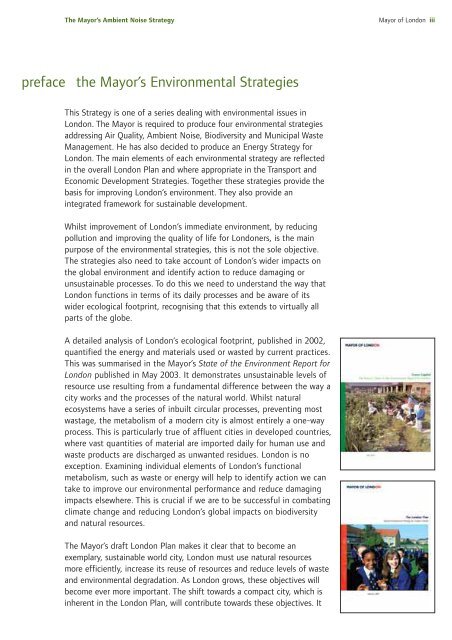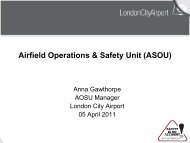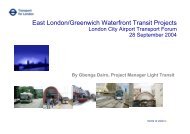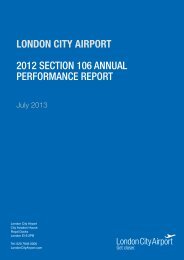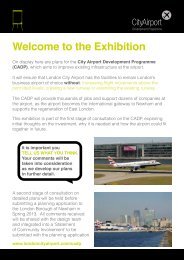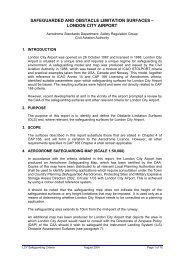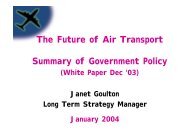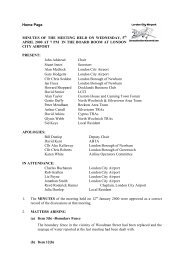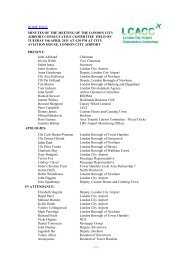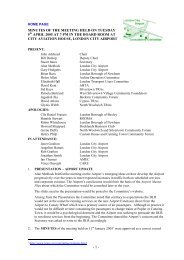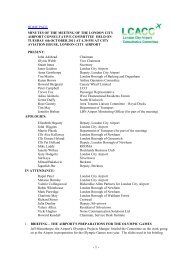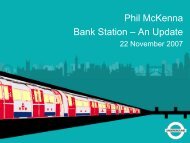The Mayor's Ambient Noise Strategy - Greater London Authority
The Mayor's Ambient Noise Strategy - Greater London Authority
The Mayor's Ambient Noise Strategy - Greater London Authority
Create successful ePaper yourself
Turn your PDF publications into a flip-book with our unique Google optimized e-Paper software.
<strong>The</strong> Mayor’s <strong>Ambient</strong> <strong>Noise</strong> <strong>Strategy</strong><br />
Mayor of <strong>London</strong> iii<br />
preface the Mayor’s Environmental Strategies<br />
This <strong>Strategy</strong> is one of a series dealing with environmental issues in<br />
<strong>London</strong>. <strong>The</strong> Mayor is required to produce four environmental strategies<br />
addressing Air Quality, <strong>Ambient</strong> <strong>Noise</strong>, Biodiversity and Municipal Waste<br />
Management. He has also decided to produce an Energy <strong>Strategy</strong> for<br />
<strong>London</strong>. <strong>The</strong> main elements of each environmental strategy are reflected<br />
in the overall <strong>London</strong> Plan and where appropriate in the Transport and<br />
Economic Development Strategies. Together these strategies provide the<br />
basis for improving <strong>London</strong>’s environment. <strong>The</strong>y also provide an<br />
integrated framework for sustainable development.<br />
Whilst improvement of <strong>London</strong>’s immediate environment, by reducing<br />
pollution and improving the quality of life for <strong>London</strong>ers, is the main<br />
purpose of the environmental strategies, this is not the sole objective.<br />
<strong>The</strong> strategies also need to take account of <strong>London</strong>’s wider impacts on<br />
the global environment and identify action to reduce damaging or<br />
unsustainable processes. To do this we need to understand the way that<br />
<strong>London</strong> functions in terms of its daily processes and be aware of its<br />
wider ecological footprint, recognising that this extends to virtually all<br />
parts of the globe.<br />
A detailed analysis of <strong>London</strong>’s ecological footprint, published in 2002,<br />
quantified the energy and materials used or wasted by current practices.<br />
This was summarised in the Mayor’s State of the Environment Report for<br />
<strong>London</strong> published in May 2003. It demonstrates unsustainable levels of<br />
resource use resulting from a fundamental difference between the way a<br />
city works and the processes of the natural world. Whilst natural<br />
ecosystems have a series of inbuilt circular processes, preventing most<br />
wastage, the metabolism of a modern city is almost entirely a one-way<br />
process. This is particularly true of affluent cities in developed countries,<br />
where vast quantities of material are imported daily for human use and<br />
waste products are discharged as unwanted residues. <strong>London</strong> is no<br />
exception. Examining individual elements of <strong>London</strong>’s functional<br />
metabolism, such as waste or energy will help to identify action we can<br />
take to improve our environmental performance and reduce damaging<br />
impacts elsewhere. This is crucial if we are to be successful in combating<br />
climate change and reducing <strong>London</strong>’s global impacts on biodiversity<br />
and natural resources.<br />
<strong>The</strong> Mayor’s draft <strong>London</strong> Plan makes it clear that to become an<br />
exemplary, sustainable world city, <strong>London</strong> must use natural resources<br />
more efficiently, increase its reuse of resources and reduce levels of waste<br />
and environmental degradation. As <strong>London</strong> grows, these objectives will<br />
become ever more important. <strong>The</strong> shift towards a compact city, which is<br />
inherent in the <strong>London</strong> Plan, will contribute towards these objectives. It


